高中英语必修3 Unit 1 Festivals around the world
- 格式:ppt
- 大小:1.93 MB
- 文档页数:29
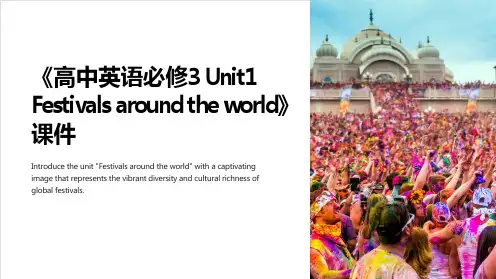
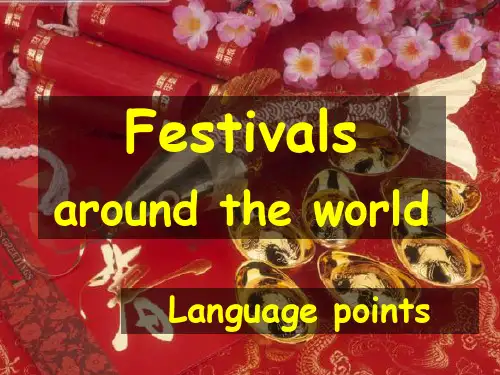
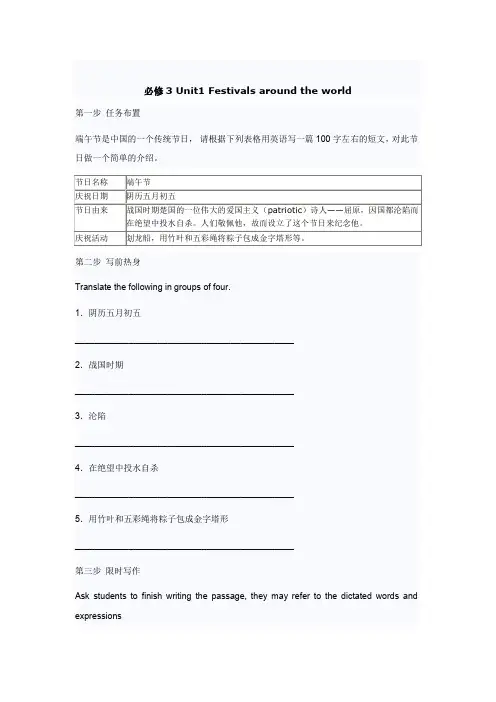
必修3 Unit1 Festivals around the world第一步任务布置端午节是中国的一个传统节日,请根据下列表格用英语写一篇100字左右的短文,对此节日做一个简单的介绍。
第二步写前热身Translate the following in groups of four.1.阴历五月初五_____________________________________________2.战国时期_____________________________________________3.沦陷_____________________________________________4.在绝望中投水自杀_____________________________________________5.用竹叶和五彩绳将粽子包成金字塔形_____________________________________________第三步限时写作Ask students to finish writing the passage, they may refer to the dictated words and expressionsSuggested article: (It can be shown after the students finish their own work.)The Dragon Boat Festiv al falls on the fifth day of the fifth lunar month. It’s generally believed that the origin of the festival is to celebrate the memory of a great patriotic poet Qu Yuan, who was a native of the State of Chu during the Warring States Period and finally drowned himself in despair after the capital was lost to its enemy. People admire him so much that every year thereafter people will row dragon boats on this day in memory of Qu Yuan. And it’s also the custom now that people make Zongzi wrapped in the shape of pyramid using bamboo leaves tied with five-colored thread.People can have a lot of fun free from the boring daily life on that day so that everyone looks forward to its arrival.第四步互改互评1. Get them to exchange their work to edit and make necessary corrections in pairs.2. Ask students to give themselves assessment according to the form.A: excellent B: satisfactory C: needs improvement3. Groups of four, choose the best one of the group as an example and read to the class. 背景资料1.中西方重要节日中国节日the Spring Festival 春节Lantern Festival 元宵节Pure Brightness Festival 清明节Dragon Boat Festival 端午节Mid-Autumn Festival 中秋节Chung Yeung Festival 重阳节New Year’s Day元旦英美国家节日Christmas Day 圣诞节New Year's Day 新年Valentine's Day 情人节April Fool’s Day愚人节Easter 复活节Halloween 万圣节Thanksgiving Day 感恩节2. 感恩节的由来1620年,102位不愿忍受英国宗教迫害的清教徒乘“五月花号”(Mayflower)船历尽艰辛,来到北美大陆,在普利茅斯住了下来。
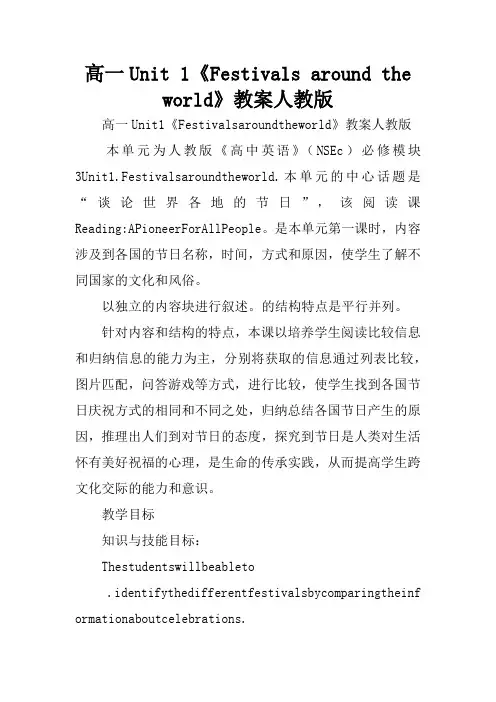
高一Unit 1《Festivals around theworld》教案人教版高一Unit1《Festivalsaroundtheworld》教案人教版本单元为人教版《高中英语》(NSEc)必修模块3Unit1.Festivalsaroundtheworld.本单元的中心话题是“谈论世界各地的节日”,该阅读课Reading:APioneerForAllPeople。
是本单元第一课时,内容涉及到各国的节日名称,时间,方式和原因,使学生了解不同国家的文化和风俗。
以独立的内容块进行叙述。
的结构特点是平行并列。
针对内容和结构的特点,本课以培养学生阅读比较信息和归纳信息的能力为主,分别将获取的信息通过列表比较,图片匹配,问答游戏等方式,进行比较,使学生找到各国节日庆祝方式的相同和不同之处,归纳总结各国节日产生的原因,推理出人们到对节日的态度,探究到节日是人类对生活怀有美好祝福的心理,是生命的传承实践,从而提高学生跨文化交际的能力和意识。
教学目标知识与技能目标:Thestudentswillbeableto.identifythedifferentfestivalsbycomparingtheinf ormationaboutcelebrations.2.explainthereasonwhythefestivalscomeintobeingbyfin dingoutthesimilaritiesanddifferences.3.describetheirfavoritefestivalsbyusingthelanguagef romthetext.教学重点和难点)为全体学生进行有效性阅读策略的指导,包括语篇分析、猜测词义,逻辑推理、归纳概括等技巧。
2)通过比较信息,归纳总结各国节日产生的原因,推理出人们到对节日的态度和节日的意义。
教学过程教学步骤教学活动设计意图Pre-reading:Step1.Brainstorm:motivatetheSsbyaskingsomequestions.Q1:Doyouanyfestivalsaroundtheworld?Step2.matchthecelebrationwiththefestivals.Q2:DoyouknowhowpeoplecelebratetheseFestivals?Doaquiz.Step2.DiscussionSsdiscussthefollowingquestionsQ1:Howdotheycomeintobeing?Q2:whatdotheyhaveincommon?Andwhataretheredifference amongthem?问题引发了学生的思考,调动学生的已知,将学生的思维活动引导到课文主题上来。
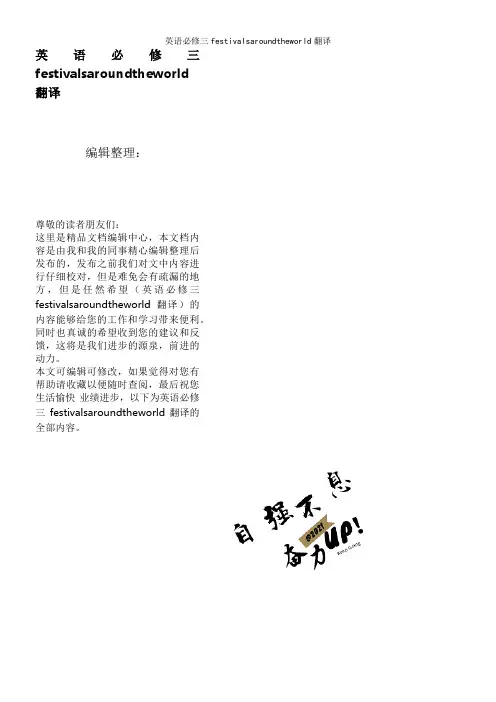
英语必修三festivalsaroundtheworld翻译编辑整理:尊敬的读者朋友们:这里是精品文档编辑中心,本文档内容是由我和我的同事精心编辑整理后发布的,发布之前我们对文中内容进行仔细校对,但是难免会有疏漏的地方,但是任然希望(英语必修三festivalsaroundtheworld翻译)的内容能够给您的工作和学习带来便利。
同时也真诚的希望收到您的建议和反馈,这将是我们进步的源泉,前进的动力。
本文可编辑可修改,如果觉得对您有帮助请收藏以便随时查阅,最后祝您生活愉快业绩进步,以下为英语必修三festivalsaroundtheworld翻译的全部内容。
unit1Festivals and celebrations Festivals and celebrations of all kinds have been held everywhere since ancient times. Most ancient festivals would celebrate the end of cold weather,planting in spring and harvest in autumn. Sometimes celebrations would be held after hunters had caught animals。
At that time people would starve if food was difficult to find, especially during the cold winter months。
Today's festivals have many origins,some religious, some seasonal, and some for special people or events.Festivals of the Dead Some festivals are held to honour the dead or to satisfy the ancestors,who might return either to help or to do harm。
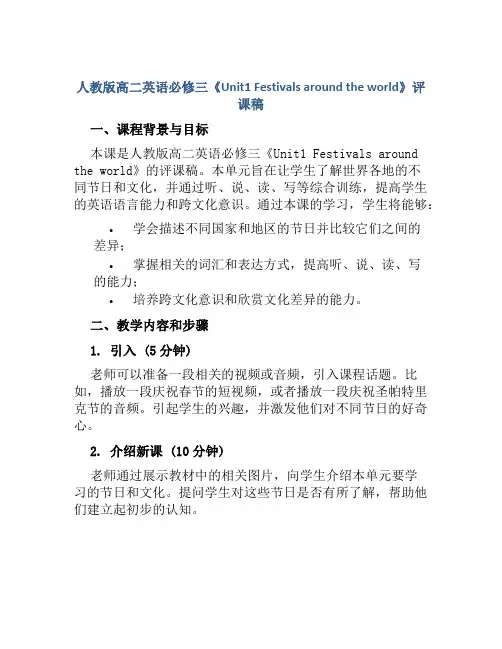
人教版高二英语必修三《Unit1 Festivals around the world》评课稿一、课程背景与目标本课是人教版高二英语必修三《Unit1 Festivals around the world》的评课稿。
本单元旨在让学生了解世界各地的不同节日和文化,并通过听、说、读、写等综合训练,提高学生的英语语言能力和跨文化意识。
通过本课的学习,学生将能够:•学会描述不同国家和地区的节日并比较它们之间的差异;•掌握相关的词汇和表达方式,提高听、说、读、写的能力;•培养跨文化意识和欣赏文化差异的能力。
二、教学内容和步骤1. 引入 (5分钟)老师可以准备一段相关的视频或音频,引入课程话题。
比如,播放一段庆祝春节的短视频,或者播放一段庆祝圣帕特里克节的音频。
引起学生的兴趣,并激发他们对不同节日的好奇心。
2. 介绍新课 (10分钟)老师通过展示教材中的相关图片,向学生介绍本单元要学习的节日和文化。
提问学生对这些节日是否有所了解,帮助他们建立起初步的认知。
3. 听力训练 (15分钟)在教材中选择一段听力材料,要求学生在听的过程中关注细节和关键词,并回答相关问题。
可以适当使用一些听力技巧和策略,帮助学生更好地理解听力材料。
4. 口语训练 (20分钟)让学生以小组为单位进行讨论,分享自己国家或地区的一个重要节日。
学生要利用所学的知识,描述节日的起源、庆祝方式、食物、活动等方面,激发他们的口语表达能力。
同时,鼓励学生积极提问和回答其他组的问题,增进彼此之间的交流。
5. 阅读训练 (15分钟)在教材中选择一篇与节日相关的短文,让学生阅读并回答相关问题。
引导学生根据文章内容,理解作者的观点和态度,并从中获取信息。
6. 写作训练 (20分钟)要求学生根据所学节日的相关信息,撰写一篇短文进行介绍。
鼓励学生运用适当的词汇和句型,表达自己的观点和看法。
同时,要求学生注意写作的逻辑结构和语法正确性。
7. 小结与反思 (5分钟)总结学生所学的重点内容,帮助他们回顾和巩固所学的知识。
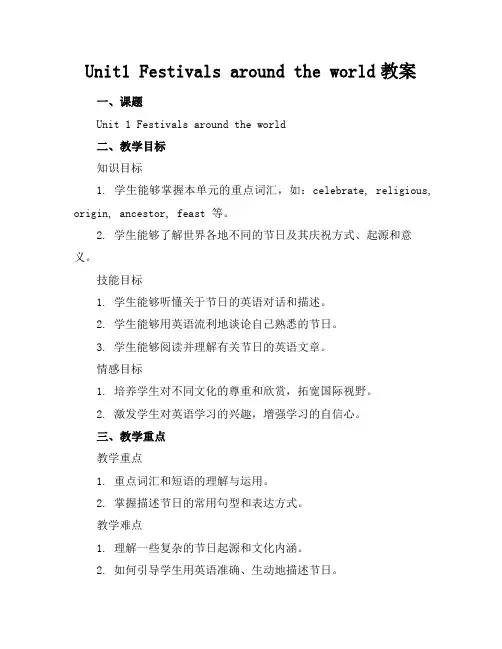
Unit1 Festivals around the world教案一、课题Unit 1 Festivals around the world二、教学目标知识目标1. 学生能够掌握本单元的重点词汇,如:celebrate, religious, origin, ancestor, feast 等。
2. 学生能够了解世界各地不同的节日及其庆祝方式、起源和意义。
技能目标1. 学生能够听懂关于节日的英语对话和描述。
2. 学生能够用英语流利地谈论自己熟悉的节日。
3. 学生能够阅读并理解有关节日的英语文章。
情感目标1. 培养学生对不同文化的尊重和欣赏,拓宽国际视野。
2. 激发学生对英语学习的兴趣,增强学习的自信心。
三、教学重点教学重点1. 重点词汇和短语的理解与运用。
2. 掌握描述节日的常用句型和表达方式。
教学难点1. 理解一些复杂的节日起源和文化内涵。
2. 如何引导学生用英语准确、生动地描述节日。
四、教学方法1. 任务型教学法:通过布置各种任务,如小组讨论、写作等,让学生在完成任务的过程中掌握知识和技能。
2. 情景教学法:创设各种节日的情景,让学生身临其境地感受和学习。
3. 交际教学法:鼓励学生用英语进行交流和互动,提高口语表达能力。
五、教学过程(一)导入(5 分钟)1. 教师播放一段关于世界各地节日庆祝的视频,然后提问学生:“What can you see in the video?” (学生回答:“I can see many people celebrating different festivals.”)2. 教师接着问:“Do you know any festivals around the world?” (学生自由回答,如:Christmas, Spring Festival, etc.)(二)词汇学习(10 分钟)1. 教师在黑板上写出本单元的重点词汇,如:celebrate, religious, origin, ancestor, feast 等,带领学生朗读并讲解其含义和用法。
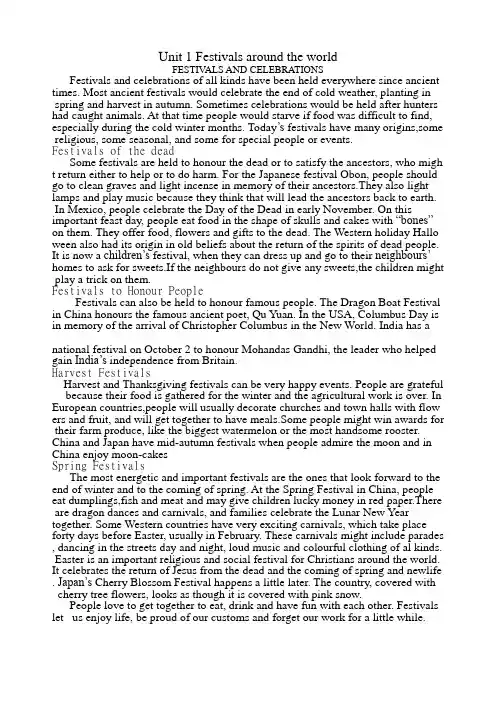
Unit 1 Festivals around the worldFESTIV ALS AND CELEBRATIONSFestivals and celebrations of all kinds have been held everywhere since ancient times. Most ancient festivals would celebrate the end of cold weather, planting in spring and harvest in autumn. Sometimes celebrations would be held after hunters had caught animals. At that time people would starve if food was difficult to find, especially during the cold winter months. Today’s festivals have many origins,some religious, some seasonal, and some for special people or events.Festivals of the deadSome festivals are held to honour the dead or to satisfy the ancestors, who migh t return either to help or to do harm. For the Japanese festival Obon, people should go to clean graves and light incense in memory of their ancestors.They also light lamps and play music because they think that will lead the ancestors back to earth. In Mexico, people celebrate the Day of the Dead in early November. On this important feast day, people eat food in the shape of skulls and cakes with “bones”on them. They offer food, flowers and gifts to the dead. The Western holiday Hallo ween also had its origin in old beliefs about the return of the spirits of dead people. It is now a children’s festival, when they can dress up and go to their neighbours’homes to ask for sweets.If the neighbours do not give any sweets,the children might play a trick on them.Festivals to Honour PeopleFestivals can also be held to honour famous people. The Dragon Boat Festival in China honours the famous ancient poet, Qu Yuan. In the USA, Columbus Day is in memory of the arrival of Christopher Columbus in the New World. India has a national festival on October 2 to honour Mohandas Gandhi, the leader who helped gain India’s independence from Britain.Harvest FestivalsHarvest and Thanksgiving festivals can be very happy events. People are grateful because their food is gathered for the winter and the agricultural work is over. In European countries,people will usually decorate churches and town halls with flow ers and fruit, and will get together to have meals.Some people might win awards for their farm produce, like the biggest watermelon or the most handsome rooster. China and Japan have mid-autumn festivals when people admire the moon and in China enjoy moon-cakesSpring FestivalsThe most energetic and important festivals are the ones that look forward to the end of winter and to the coming of spring. At the Spring Festival in China, people eat dumplings,fish and meat and may give children lucky money in red paper.There are dragon dances and carnivals, and families celebrate the Lunar New Year together. Some Western countries have very exciting carnivals, which take place forty days before Easter, usually in February. These carnivals might include parades , dancing in the streets day and night, loud music and colourful clothing of al kinds. Easter is an important religious and social festival for Christians around the world. It celebrates the return of Jesus from the dead and the coming of spring and newlife . Japan’s Cherry Blossom Festival happens a little later. The country, covered with cherry tree flowers, looks as though it is covered with pink snow.People love to get together to eat, drink and have fun with each other. Festivals let us enjoy life, be proud of our customs and forget our work for a little while.。
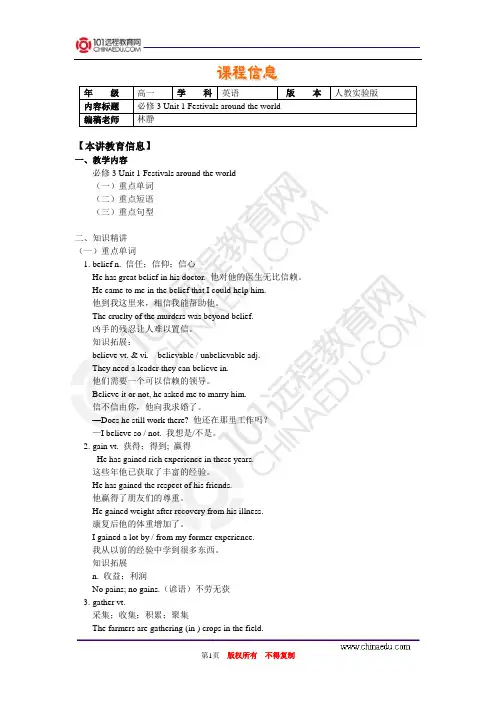
【本讲教育信息】一、教学内容必修3 Unit 1 Festivals around the world(一)重点单词(二)重点短语(三)重点句型二、知识精讲(一)重点单词1. belief n. 信任;信仰;信心He has great belief in his doctor. 他对他的医生无比信赖。
He came to me in the belief that I could help him.他到我这里来,相信我能帮助他。
The cruelty of the murders was beyond belief.凶手的残忍让人难以置信。
知识拓展:believe vt. & vi. believable / unbelievable adj.They need a leader they can believe in.他们需要一个可以信赖的领导。
Believe it or not, he asked me to marry him.信不信由你,他向我求婚了。
—Does he still work there? 他还在那里工作吗?—I believe so / not. 我想是/不是。
2. gain vt. 获得;得到; 赢得He has gained rich experience in these years.这些年他已获取了丰富的经验。
He has gained the respect of his friends.他赢得了朋友们的尊重。
He gained weight after recovery from his illness.康复后他的体重增加了。
I gained a lot by / from my former experience.我从以前的经验中学到很多东西。
知识拓展n. 收益;利润No pains; no gains.(谚语)不劳无获3. gather vt.采集;收集;积累;聚集The farmers are gathering (in ) crops in the field.农民们正在田野里收割庄稼。
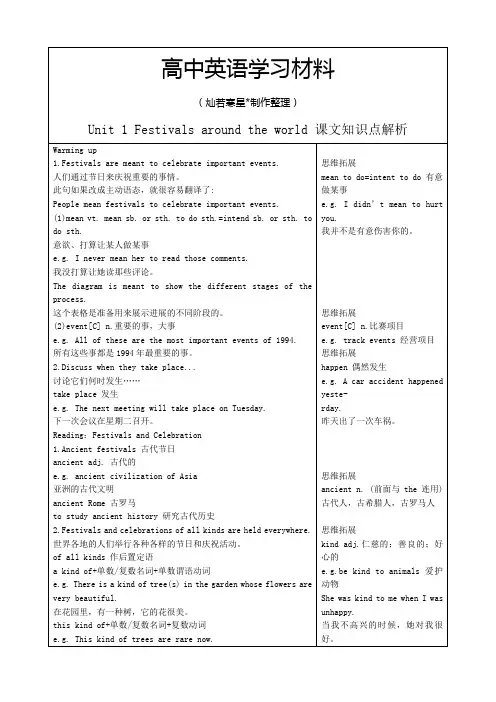
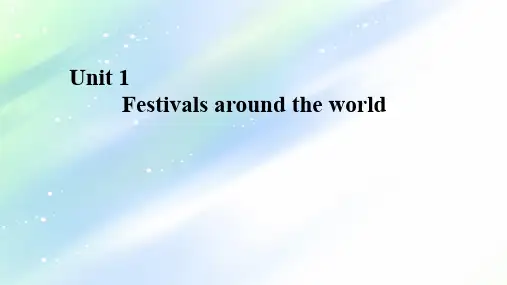
Festivals around the world单元要点归纳提升to deathto dofor starving starvationa strong belief holdinbeyond belief believebelieve in believe it or notfrom赢得时间体重增加增加力气/权力/经验一等奖;第一名 因……而获奖 为某人颁发奖品foradmiration钦佩地admiringforwith/without permitto dodoingto sb. forforapology因(做)某事向某人道歉接受/拒绝某人的道歉inin借酒消愁drowningdrownedto do使某人想起offordoing原谅某人某事不计前嫌oftake one's placein替代某人;顶替某人honour favour search place need charge praise case掩盖某事打扮某人;为某人化妆asin捉弄某人out ofintointo out up downdoingforof多么有趣呀!做某事很有趣over on out off in to down失信;食言;失约承认说错话;收回前言和……交谈和……争论总之换句话说out of lose catch take/have breath breathe breathlessup out aside down abouteither give them as gifts to friends or hang them in their housesWith the children at schoolas though our team is going to winIt is obvious thatcan make your study go to succeedSeeing my father's driving awayMay everyone be happymust be a big girl can't be cleaningwon't be easily torncan't fly Could you helpyou can understand mewill not forget to go over my lessoncould see must offershould avoid hurtingThe Spring Festival always reminds us of the family reunion There are all kinds of activities during the Spring Festival Children especially look forward to the Spring FestivalIt's also a good time for adultsThey can express appreciation, make an apology or forgive each other。
Unit 1 Festivals around the world(新课标版高一英语必修三教案教学设计)Unit 1 Festivals around the worldThe First Period (Warming up & Pre-reading)Step One: Lead-inFree Talk: Did you have a good time in your winter holidays?When did you feel most happy and excited? Why?( At the Spring Festival. Because it's the most important festival in our country....)Step Two: Warming up1. Let the Ss think about the other Chinese festivals.( Lantern Festival, Pure Brightness Festival, Dragon Boat Festival, Mid-Autumn Festival, New Year's Day, Chung Yeung Festival....)2. Discussion One1)Let the Ss look at the information about Chinese festivals and discuss another four Chinese festivals according to the example in warming up: When does the festival come?What do people celebrate?What do people do?Festivals Date festivals DateNew Year January1st Teachers' Day September 10thInternational Women's Day March 8 National Day October 1stArbor Day March 12th The Spring Festival Lunar New Year International labor Day May 1st Dragon Boat Festival the fifth day of the fifth lunar monthInternational Children's Day June 1st Mid-Autumn Festivalthe 15th day of the 8th lunar monthArmy Day August 1st Lantern Festival the 15th day of the 1st lunar monthChinese Youth Day May 4th Pure Brightness Day April the fifth2) Let the Ss fill in the form in the warming up and ask some to share their opinions with the whole class.3 Discussion TwoTalk about some foreign festivals.( Christmas, April Fools Day, Easter Day, Halloween, Valentine's Day, Thanksgiving Day, Obon...)Step three: Pre-readingLet students think about the questions:1) What is your favourate holiday of the year? Why?2)What festivals or celebrations do you enjoy in your city or town? Do you like spending festivals with your family or with friends? What part of a festival do you like best- the music, the things to see, the visits or the food?Step Four: Language Points1.mean to do 打算做某事mean doing 意味着….I never meant him to work for us.Passing the entrance examination means being admitted into college.2. celebrate vt.(1) do sth to show that a day or an event is important 庆祝;祝贺celebrate Christmas / one’s birthday / a wedding anniversary / a victory(2) praise and honor 赞扬;称颂The names of many heroes are celebrated by the poets.词语辨析:celebrate, congratulatecelebrate后常接日期、事情或场合。
人教版|高中英语必修3必考的10篇英语作文【作文一】话题:节日(Unit1 Festivals around the world)假如你是李华。
你的美国笔友Mike即将随其父母来中国,并中国度过中秋节。
他来信向你询问有关中秋节的习俗,请你告诉他有关中秋节的习俗。
要点如下:1历史悠久。
2 中国人独有的传统节日。
3 家庭团圆。
4 共进晚餐。
5 吃月饼。
6 赏月。
要求:1 词数100左右。
2 可适当添加细节。
3 开头已给出,不计入总词数。
Dear Mike,I’m glad to know that you are coming to China with your parents and spend the Mid-Autumn Day here.The Mid-Autumn Day is a traditional festival with a long history which is celebrated only by Chinese people. It falls on August 15th of the Chinese lunar year, when people of a family get together and enjoy the dinner together. After that they eat mooncakes, which stands for the spirits of the festival-unity. Often if the weather permits, they will go out of thehouse to enjoy the bright moonlight, talking about something pleasant. It is one of the most important festivals for Chinese people.I wish you a pleasant journey and I’m sure you will like our traditional Mid-Autumn Day. Yours, Li Hua【作文二】话题:节日介绍(Unit1 Festivals around the world)假设你的外国朋友Eric对中国的端午节非常感兴趣,请根据下面的提示写一篇5句话作文,向他介绍这一节日。
必修3 Unit 1 Festivals around the world第一节:语言结构(共10题,每题1.5分.共15分)It was _1_ (介词) the morning. Port Richard, a boy of twelve, was standing _2__(介词) the foot of the stairway up to the Panama. He had _3__(leave)home early, __4_(违背) his father’s wishes, _5_( see )the ships at the port. Suddenly he saw a small fire_6_(介词)one end of the Panama. But there was nobody else around, and in no time, the fire grew dangerously big.__7_(see) this, the boy shouted at the top of his voice. His shout woke up the port workers living nearby, _8__(引导词)were enjoying a Sunday morning in bed.The Panama was among the six ships in the port where there were lots of old buildings, shops and houses nearby. It was carrying oil, paint and paper from the Far East.The fire burned__9_(冠词)great deal of paper, which was why it spread very quickly. The end of the ship was now black with smoke, but thanks to the boy, the fire didn’t reach the paint or oil.The boy was also lucky, for his father was pleased rather than _10__(生气) with him.第二节:完形填空(共10小题;每小题1.5分,共15分)阅读下面短文,从短文后所给各题的四个选项(A、B、C、D)中选出能填入空白处的最佳选项。